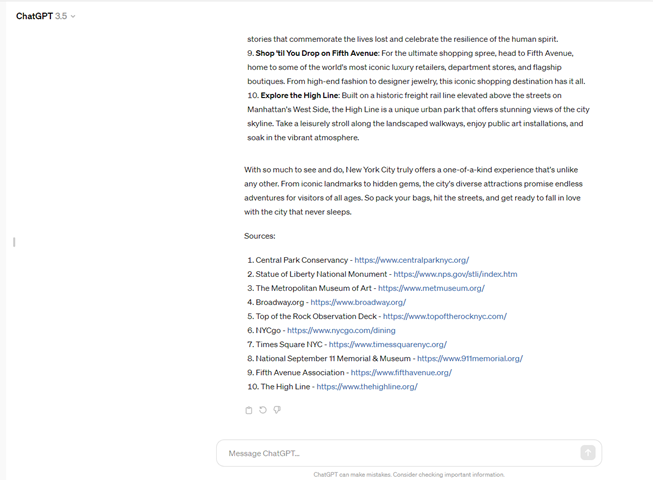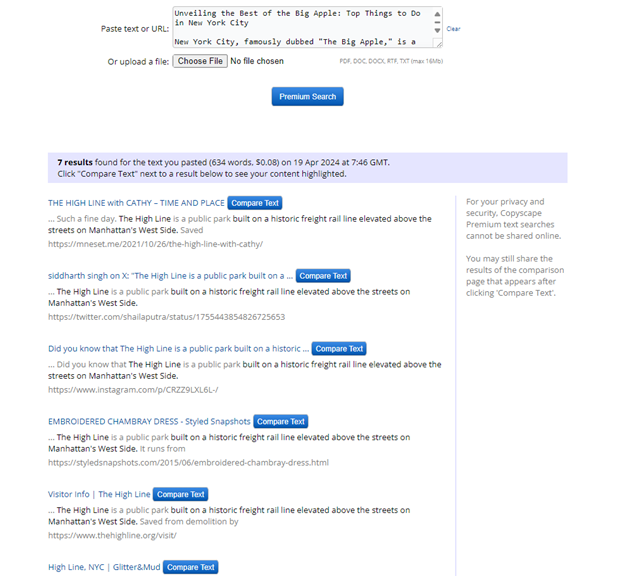AI can help brands and marketers be more efficient and productive and get things done faster, but it’s not perfect and has some drawbacks.
With the rise and adoption of AI in SEO workflow, processes and toolsSEO professionals must take an ethical approach to artificial intelligence.
What exactly does an ethical approach to AI mean?
An ethical approach is to use AI Technologies in a transparent, fair and responsible manner while respecting the privacy of users and guaranteeing the accuracy and integrity of the information.
We are all aware that the use of AI is imperfect and can be full of inaccurate, biased, fuzzy, etc. information, which can cause many problems for agencies and marketers who rely on it. AI to create content.
With the March core update, sites that used AI content that wasn’t edited, original, or useful lost a substantial portion of their organic traffic.
Here are some ways we can use AI to be more ethical.
Be transparent and provide information
Don’t use generative AI to create content for publishing. If you use generative AI in parts of your process, you need to be completely transparent with the brands you work with about how you use AI in your SEO practices.
Maintain accuracy and integrity
If you plan to use AI, you need to take a human approach to writing long-form content. Humans should still create content, but AI can be helpful in brainstorming, organizing, rephrasing, transcribing, and redoing content. In each case, the originality of the results must be verified using Copyscape or the tool of your choice.
Additionally, the information must be reliable and accurate. With the HCU integrated into March core updateIt’s more important than ever to focus on people-focused content rather than content that isn’t useful, helpful, or doesn’t satisfy end-user intent.
Be original and useful
While Google focuses on good user and people-driven content experience, we should not rely on AI content due to insufficient training data and lack of originality. AI might be great for compiling a list of notes from people with direct experience and integrating them into a coherent article, for example, but not for producing the list and the facts, even with fact-checking.
Follow search engine guidelines
It is imperative that we follow search engine guidelines and ethical standards.
AI should not be used to engage in practices such as keyword stuffing, obfuscation, or building entry pages. Instead, it should support the creation of useful, high-quality content.
Take a look at Principles of Google AI – Google AI.
Promote a positive impact
Ethically using AI in SEO also means considering the broader impact on society. This involves promoting trustworthy and useful content that contributes positively to users’ knowledge and well-being.
Develop securely and respect confidentiality
If you build your own tools and platforms with AI, make sure you have strong security protocols and practices in place to avoid causing harm.
Always evaluate your technologies before releasing them into the production environment to ensure they are safe and secure. Be sure to continue monitoring it after it is released to the general public.
LLMs are not secure. It may be necessary to obtain legal advice before implementing certain types of AI, such as generative AI, in processes that include user/customer information. Updating a privacy policy may not be enough.
Never put proprietary and confidential information into a generative AI chatbot like ChatGPT. Most LLMs record all user input and the information can be used to generate responses to other users.
Respect intellectual property and originality
One of the biggest issues surrounding AI is intellectual property (IP). If I create content using ChatGPTWho does it belong to?
We need to ensure that when AI recommends content, it is original and does not come from elsewhere. This can be problematic because some AI platforms don’t list the source of the information unless you specify chatbots to do so.
ChatGPT can tell you where content sources come from if you list them in your prompt. For example, I asked ChatGPT to write me a 750-word blog post about the top things to do in New York and list the sources, and it did.
 Screenshot of ChatGPT, April 2024
Screenshot of ChatGPT, April 2024If you obtain information from ChatGPT, you must credit the source and ensure that it does not copy other people’s content. Additionally, setting clear rules for using AI in content creation can help avoid legal issues and ensure you are being fair and honest.
I checked the content I created in ChatGPT, and according to Copy landscapeit is full of similar texts.

Screenshot from Copyscape, April 2024
Note: Please keep in mind that asking LLMs to cite sources does not guarantee that you are citing the correct content or that the content is original. The best and safest way to avoid accidental plagiarism is to have humans do the research and write the content.
Google is not about artificial and unoriginal content
With the rapid growth of AI-based tools entering the market and the integration of AI into many platforms and its use in everyday SEO tasks, it is extremely important for us to adhere to the principles AI ethics to ensure the use of AI in SEO. supports a fair, equitable, and user-centered research ecosystem.
Google has always been focused on quality, original content that provides value to end users and not content that is entirely artificial, offers no value, lacks trust, is thin, duplicate, lacks originality, etc.
In order to compete in today’s competitive and ever-changing SERPs, focusing on improve EEAT is more important than ever because it’s a quality signal that shows Google and end users that you are the subject matter expert and authority in your niche.
It is highly recommended to ask thought leaders and experts in your niche to create your content and show their expertise on your site.
Additionally, it’s important to focus on user experience and ensure that your site loads quickly, is easy to navigate, and helps users find exactly what they came to your site for.
More resources:
Featured image: aniqpixel/Shutterstock


